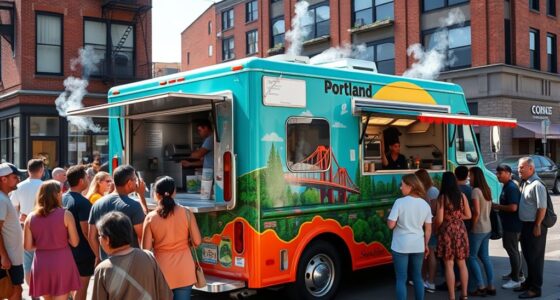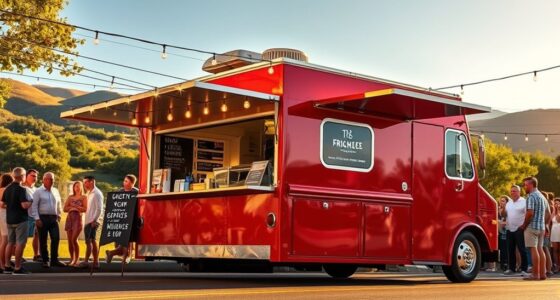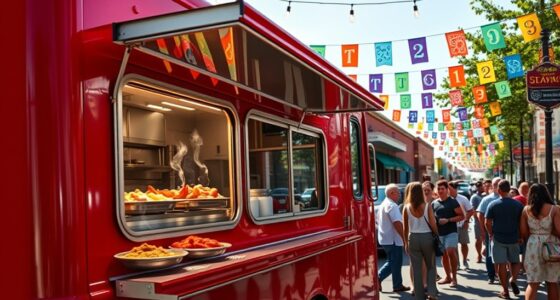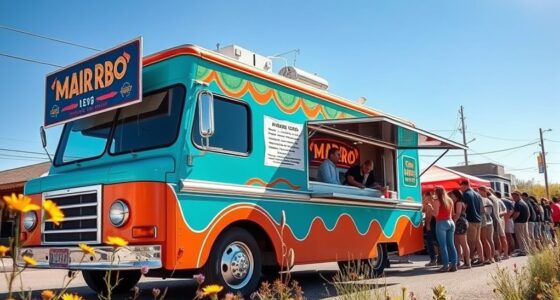To start a food truck in Tallahassee, focus on understanding the local food scene by partnering with farmers and participating in community events. Navigate city regulations by completing permits online and ensuring proper parking and kitchen licensing. Secure funding through grants and insurance, then design a menu with local ingredients and fair pricing. Use social media and local partnerships to market your truck effectively. For more tips on building a successful Tallahassee food truck, keep exploring this guide.
Key Takeaways
- Complete Tallahassee’s online permits and schedule inspections early to ensure timely food truck launch.
- Build relationships with local farmers and artisans to source fresh ingredients and strengthen community ties.
- Secure funding through grants, obtain liability insurance, and plan a detailed budget covering all startup costs.
- Design an appealing menu with local ingredients, set competitive prices, and incorporate mobile payment technology.
- Participate in community events, utilize social media marketing, and develop a memorable brand to grow your customer base.
Starting With Local Food Scene

Tallahassee’s vibrant food scene offers a perfect foundation for exploring local flavors through food trucks. The city’s diverse culinary scene is driven by fresh, regional ingredients and innovative chefs enthusiastic to showcase Florida’s flavors. By tapping into the local food scene, you can create a menu that resonates with residents and visitors alike. Culinary collaborations are common here, allowing you to partner with local farmers, artisans, and other food vendors to craft unique offerings. These partnerships not only enhance your menu but also strengthen your ties to the community. Embracing Tallahassee’s culinary culture helps you stand out in the competitive food truck market and build a loyal customer base eager for authentic, locally inspired cuisine. Incorporating elements of local food culture can further elevate your food truck’s appeal and authenticity.
Understanding Local Requirements

To operate a food truck in Tallahassee, you’ll need to understand the local permit process, which you can complete online. It’s a good idea to schedule your inspection appointment early to avoid delays. Also, make sure to park only in designated street zones to stay compliant with city regulations. Additionally, familiarize yourself with signs of spoilage in ingredients to ensure food safety and quality.
Online Permit Application Process
Guiding the online permit application process is a crucial step in starting your food truck business in Tallahassee. To begin, visit the city’s official website and locate the online permit portal. The application process is straightforward but requires careful attention to detail. You’ll need to provide essential business information, including your food truck’s specifications, proof of insurance, and health and safety certifications. Confirm all documents are up to date before submission. Filling out the online permit application is quick, but double-check for accuracy to prevent delays. Once submitted, you may receive notification for further steps or additional documentation requests. Completing this online permit streamlines your approval process, saving time and helping you move closer to launching your food truck business in Tallahassee efficiently.
Schedule Inspection Appointment Early
Scheduling your inspection appointment early is essential to avoid delays in obtaining your food truck permit. Inspection scheduling can impact your permit timing, so don’t wait until the last minute. Contact the Tallahassee health department or relevant local agency as soon as you complete your permit application. Confirm their available inspection slots and secure an appointment that fits your timeline. By doing this, you ensure your food truck meets all health and safety standards before your planned launch date. Early inspection scheduling allows ample time to address any issues that might arise, preventing permit delays later. Remember, prompt scheduling helps keep your permit process on track, so you can start serving customers without unnecessary setbacks. Stay proactive to streamline your food truck startup in Tallahassee.
Designated Street Parking Zones
Understanding the designated street parking zones in Tallahassee is essential for legally operating your food truck. You need to be aware of specific areas where parking is permitted and avoid violations that could lead to fines or towing. Pay close attention to street signage indicating parking rules, times, and restrictions. Parking enforcement actively monitors these zones, so adherence is critical for smooth operations. To stay compliant:
- Identify zones with designated parking for food trucks
- Observe street signage for parking hours and restrictions
- Avoid parking in no-parking or restricted zones
- Regularly check for updates on parking regulations in your area
Following these steps helps you avoid penalties and guarantees your food truck runs efficiently within Tallahassee’s local requirements.
Setting Up Your Base of Operations
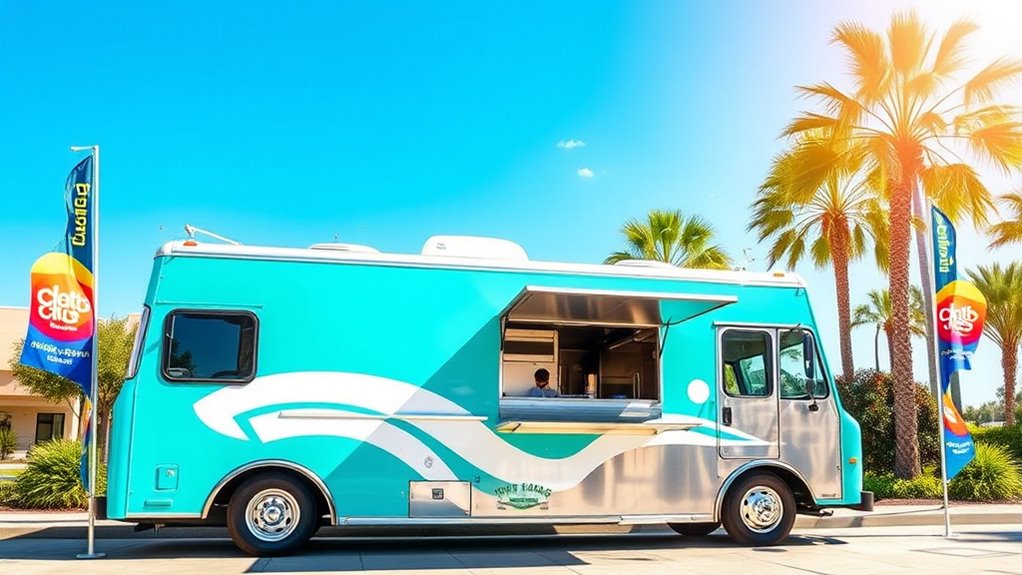
When setting up your base of operations, you’ll need to take into account shared kitchen licensing requirements to stay compliant. Planning your custom kitchen layout is essential to maximize space and efficiency. These steps ensure your food truck runs smoothly and meets all local regulations. Additionally, considering grocery savings strategies can help you manage costs effectively as you establish your business.
Shared Kitchen Licensing Requirements
Setting up your food truck’s base of operations often requires obtaining the appropriate shared kitchen licensing. This guarantees you’re compliant with local health and safety standards. To secure shared kitchen licensing, you’ll need to meet specific requirements for commercial kitchen permits. Here are key steps:
- Submit an application to the Tallahassee health department for shared kitchen licensing.
- Provide proof of ownership or lease of the commercial kitchen space.
- Pass health inspections to ensure the kitchen meets sanitation standards.
- Maintain ongoing compliance through regular inspections and documentation.
Having the proper commercial kitchen permits not only keeps you legal but also builds customer trust. Always stay updated on licensing renewals and local regulations to keep your food truck business running smoothly.
Custom Kitchen Layout Planning
Designing an efficient kitchen layout is a crucial step in setting up your food truck’s base of operations. Focus on kitchen ergonomics to guarantee smooth workflow and reduce fatigue during busy hours. Position appliances and workstations logically, such as placing the stove near prep areas and the sink close to both. Prioritize layout efficiency by minimizing movement and avoiding cross-traffic, which speeds up service and enhances safety. Use compact storage solutions to maximize space without cluttering. Consider your specific menu and prep process to customize the layout accordingly. Proper planning ensures you can work comfortably, stay organized, and serve customers quickly. A well-designed kitchen not only improves productivity but also helps meet health and safety standards seamlessly.
Budgeting and Financing Your Food Truck
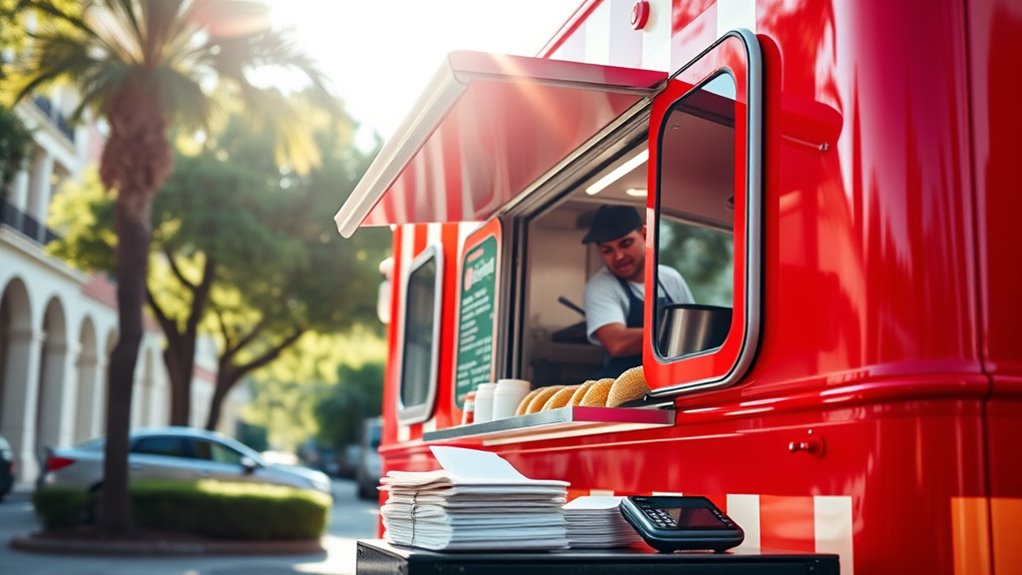
To start financing your food truck, you need to ensure the initial purchase costs and how you’ll cover them. Applying for small business grants can help ease some expenses, but you’ll also need liability insurance to protect your investment. Budgeting carefully ensures you’re prepared for all the financial aspects involved. Additionally, understanding the importance of proper application timing can help you maximize your investment and ensure your startup process goes smoothly.
Initial Truck Purchase Costs
Purchasing your food truck is a significant initial investment that requires careful budgeting and planning. The cost varies based on truck size, condition, and customization. Expect to spend between $20,000 and $100,000 for a reliable, well-equipped vehicle. To stay within your budget, consider these key factors:
- Truck purchase price – New or used options impact costs.
- Initial modifications – Equipment and branding add to expenses.
- Truck maintenance – Reserve funds for ongoing upkeep to prevent unexpected costs.
- Vendor relationships – Budget for supplies and partnerships that keep your operation running smoothly.
Applying for Small Business Grants
Securing funding is an essential step in turning your food truck dream into reality, especially after accounting for initial costs. To do this, explore various grant opportunities available for small businesses. Local government programs and economic development agencies often offer grants tailored for entrepreneurial ventures like food trucks. Additionally, check out federal grant programs and private funding sources that support small business growth. Applying for these grants requires a solid business plan and clear demonstration of how your food truck will benefit the community. Research thoroughly to identify the most suitable options, and prepare your applications carefully. Securing grants can provide vital capital without adding debt, helping you cover expenses like equipment, licenses, and starting inventory.
Liability Insurance for Food Trucks
Liability insurance is a critical component of budgeting for your food truck, as it helps protect your business from potential lawsuits and financial losses. Adequate liability coverage guarantees you’re protected if someone gets injured or if there’s property damage during operations. When filing insurance claims, having proper coverage can streamline the process and minimize out-of-pocket expenses. To manage this effectively:
- Determine the level of liability coverage needed based on your truck size and menu.
- Shop around for policies that offer thorough protection without breaking your budget.
- Regularly review your coverage to keep up with your business growth.
- Understand the claims process to ensure quick resolution and ongoing protection.
Proper liability insurance safeguards your investment and keeps your food truck running smoothly.
Designing Your Menu and Pricing Strategy
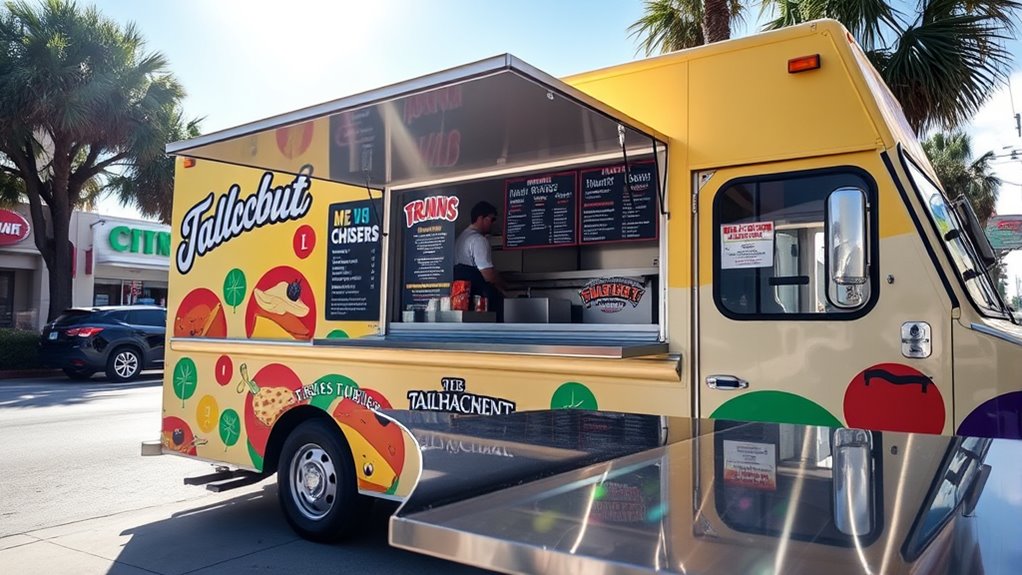
When designing your menu, consider how you source ingredients to keep costs low without guaranteeing quality. Analyzing your food costs precisely helps you set prices that attract customers and ensure profit. By balancing these factors, you can create a menu that’s both appealing and financially sustainable. Additionally, understanding mammography guidelines can help you stay informed about health screening standards, which may be relevant if your food truck caters to health-conscious customers.
Ingredient Sourcing Strategies
Designing your menu and pricing strategy starts with carefully selecting ingredients that balance quality, cost, and supplier availability. Your ingredient quality directly impacts your menu’s reputation, so build strong supplier relationships to guarantee consistent, high-quality supplies. Reliable supplier partnerships help you access fresh ingredients at competitive prices and adapt to seasonal changes. To optimize sourcing, consider these strategies:
- Identify local farmers and markets for fresh, seasonal ingredients.
- Develop relationships with multiple suppliers to prevent shortages.
- Negotiate bulk purchasing discounts to lower costs.
- Verify supplier reliability and quality standards regularly.
Analyzing Food Costs Precisely
To set accurate menu prices and guarantee profitability, you need to analyze your food costs precisely. Conducting a thorough cost analysis involves carefully tracking ingredient pricing for each menu item. Start by listing all ingredients and their purchase costs, then determine how much of each ingredient is used per serving. This helps you calculate the true cost of each dish. Keep in mind that ingredient pricing can fluctuate, so regularly updating your cost analysis ensures your prices stay profitable. By understanding these costs, you can identify which items are most profitable and adjust your menu accordingly. Precise food cost analysis allows you to set competitive prices without sacrificing margins, giving your food truck a solid financial foundation for success.
Technology and Operations

Integrating mobile card readers makes it easy for your customers to pay quickly and securely. Using real-time stock tracking software helps you stay on top of inventory and avoid shortages. These tools streamline your operations and keep your food truck running smoothly.
Mobile Card Readers Integration
Implementing mobile card readers is essential for guaranteeing smooth transactions at your food truck. They streamline the payment process, enabling quick, secure, and contactless payments that improve customer experience. When choosing a system, consider compatibility with your point of sale setup and ensure it supports contactless payments like NFC.
To optimize your setup, focus on these key ideas:
- Device Compatibility: Ensure your mobile card reader integrates seamlessly with your existing POS system.
- Security Features: Choose readers with encryption and fraud protection to safeguard customer data.
- Ease of Use: Opt for user-friendly devices that simplify transactions during busy hours.
- Connectivity Options: Select readers that support reliable Wi-Fi or Bluetooth connections to prevent disruptions.
Effective integration helps deliver fast, secure, and contactless payments, boosting customer satisfaction.
Real-Time Stock Tracking Software
Real-time stock tracking software is essential for keeping your food truck operations smooth and efficient. It streamlines inventory management by providing instant updates on ingredient levels, helping you avoid shortages or overstocking. With real-time data, you can quickly identify which supplies need replenishing, ensuring your supply chain remains uninterrupted. This software simplifies ordering processes, reduces waste, and saves you money by preventing over-purchasing. It also helps you analyze usage patterns to forecast future needs accurately. By maintaining precise inventory records, you minimize errors and ensure your menu stays fully stocked. Overall, real-time stock tracking software enhances your ability to manage your food truck’s inventory effectively, keeping operations seamless, improving customer satisfaction, and boosting your bottom line.
Marketing and Growing Your Presence
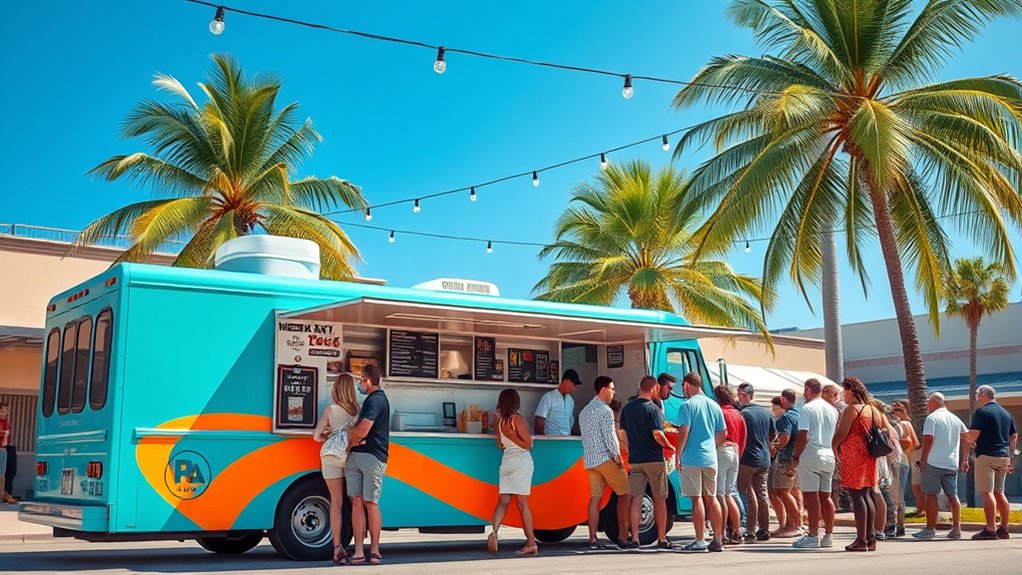
To grow your food truck’s presence, focus on highlighting popular local events where you can attract more customers. Keep your audience engaged by sharing Instagram Stories weekly, showcasing behind-the-scenes moments and special offers. These strategies will help you build a loyal following and boost your visibility across Tallahassee.
Identifying Popular Local Events
Have you ever wondered which local events can give your food truck the biggest boost in visibility? To maximize exposure, focus on popular local food festivals and community event partnerships. These events attract large crowds enthusiastic to try new flavors, giving your truck prime real estate. Here are some ideas:
- Attend annual local food festivals to showcase your menu.
- Partner with community organizations for special events.
- Participate in farmers markets and street fairs.
- Collaborate with local breweries or concert series for after-hours sales.
Engaging Instagram Stories Weekly
Consistently engaging your audience with Instagram Stories each week can substantially boost your food truck’s visibility and grow your following. Share behind-the-scenes food photography, daily specials, or customer favorites to keep your content fresh and authentic. Use Stories to showcase your location at popular events or share quick cooking tips, reinforcing your social media branding. To stay organized, consider this approach:
| Content Type | Purpose |
|---|---|
| Food Photography | Attract attention and highlight menu items |
| Customer Interactions | Build community and trust |
| Daily Specials | Drive immediate sales |
| Event Participation | Promote your presence at local events |
| Behind-the-Scenes | Personalize your brand and create authenticity |
This regular content keeps followers engaged and enthusiastic to visit your food truck.
Tallahassee Food Truck Dreams
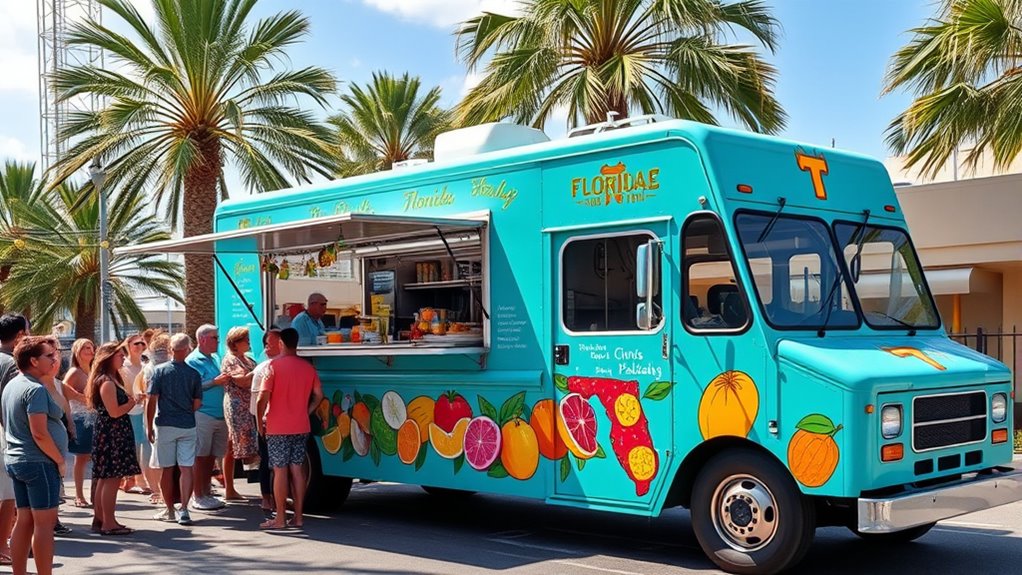
Dreams of launching a food truck in Tallahassee are fueling the ambitions of many aspiring entrepreneurs. Your tallahassee food truck dreams can become a reality by tapping into the city’s rich local cuisine inspiration. To start, focus on understanding what unique flavors resonate with the community. Next, develop a menu that showcases local ingredients and culinary traditions. Consider these key steps:
- Research popular local dishes for authentic inspiration
- Connect with local suppliers for fresh ingredients
- Create a standout, memorable brand
- Scout high-traffic spots for your food truck’s debut
Frequently Asked Questions
What Are the Best Locations to Park My Food Truck in Tallahassee?
You should park your food truck in high-traffic areas like downtown Tallahassee, near college campuses, or popular event venues. Make sure to check parking regulations and city zoning laws to avoid fines or violations. Look for spots with ample foot traffic, especially during lunch and dinner hours, and consider partnering with local businesses or events to boost sales. Always verify permits and parking restrictions before settling in your chosen location.
How Can I Build a Loyal Customer Base Quickly?
You can build a loyal customer base quickly by actively engaging on social media, posting appealing photos and updates about your truck’s location and specials. Encourage repeat visits with loyalty programs that reward customers for their patronage. Offer exclusive deals or discounts to followers, and ask for feedback to show you value their input. Consistent, friendly interaction and incentives make customers feel appreciated and enthusiastic to return.
Are There Specific Health Codes for Mobile Vendors in Tallahassee?
You need to hit the ground running, so don’t let health codes catch you off guard. In Tallahassee, mobile vendors must pass a health inspection that covers food safety, proper sanitation, and storage practices. Make sure your food truck complies with Florida Department of Health regulations, including obtaining necessary permits and following safety guidelines. Staying ahead of these rules guarantees you serve safe food and keep your business on the right side of the law.
What Permits Are Needed for Special Events and Festivals?
For special events and festivals, you’ll need to obtain food truck permits and event vendor licensing from Tallahassee’s health department. You should apply well in advance, providing details about your food truck operations and menu. Make sure your permits are current, and check if the event organizer requires additional documentation. These licenses guarantee you comply with local safety and health standards, helping you serve delicious food without issues.
How Can I Differentiate My Food Truck From Competitors?
To differentiate your food truck from competitors, focus on strong branding strategies that highlight your unique identity. Develop a memorable logo, catchy name, and consistent visuals that appeal to your target audience. Offer a unique menu with signature dishes or fusion flavors that set you apart. Engage with customers through social media and exceptional service, making your truck recognizable and memorable in Tallahassee’s vibrant food scene.
Conclusion
Starting a food truck in Tallahassee is an exciting journey. Just like Lisa, who launched her Cajun-inspired truck last year and now caters at local events, you can turn your passion into a thriving business. By understanding the local scene, securing permits, and crafting a unique menu, you’ll stand out. Keep your marketing strong and stay adaptable—your food truck dreams in Tallahassee can become a delicious reality.


